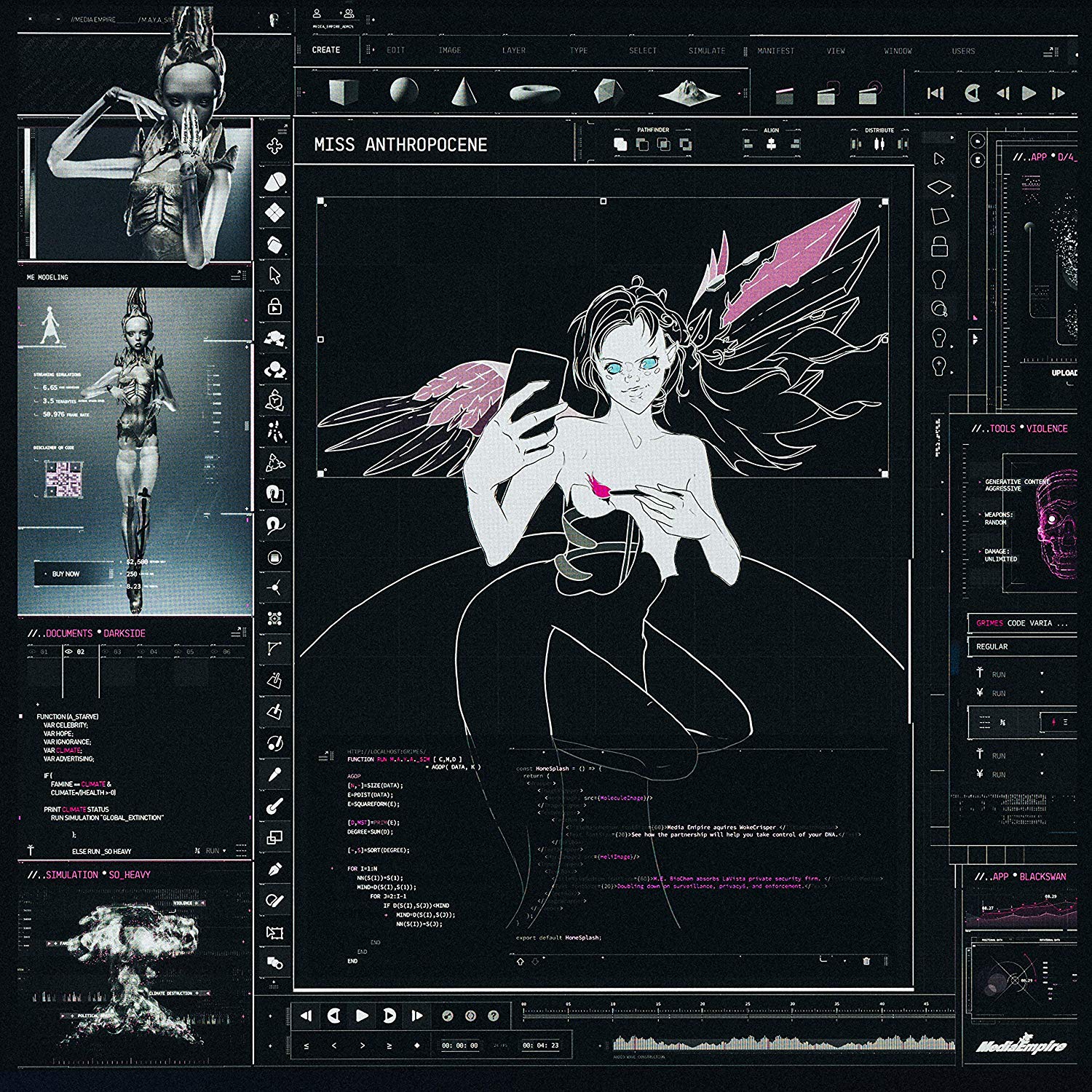
Not quite what was expected. Or intended.
Miss Anthropocene. Misanthrope. A clever, dual-title for an album that’s decidedly worthy of such a name – but is it too simple a duality? Is the villain-esque proto-religion that Grimes creates representative of the depth and darkness that the Anthropocene builds? The answer, like the album name, is delightfully multi-faceted. And honestly, I’m here for the resistance to definition.
Miss Anthropocene takes place in a cosmology that revolves around the titular character, an anthropocentric god. “She’s naked all the time and she’s made out of ivory and oil,” Boucher describes.
While it’s very much inspired by the climate crisis, it’s not just that. Grimes realises that the Anthropocene isn’t just a mix of weather patterns and CO2 levels, it’s about human interactions, society and lots of little things jumbled up together. We should view the Anthropocene in the way the philosopher Timothy Morton views it, as a ‘hyperobject’ – a thing that exists beyond our experience of it – beyond space and time, beyond singular things. That’s the Anthropocene, that’s Miss Anthropocene.
“I wanted to make climate change fun,” stated Boucher in an interview with Crack. It’s certainly a unique artistic approach, but it’s also an agenda that serves to align itself more with dangerous greenwashing than any progressive climate responsibility. It’s hard hearing that climate change can be called ‘fun’ when many people are already suffering.
But maybe that’s the point – that Grimes is playing the villain to tell a different story. The album is meant to be gleeful misanthropy and succeeds in painting such a picture, but I’d argue upon heavy listening from climate-savvy ears, it may also succeed in creating something that’s not quite culturally relevant, that somewhat misses the mark.
In their reading of the album, The Telegraph calls Grimes (or Miss Anthropocene) the ‘evil goddess of eco-pop’, and this hits on one of the main issues of the album – what is classed as ‘eco-pop’? Tracks such as ‘Before the fever’ are evidently climate-influenced, employing a lot of ecological language. “This is the sound of the end of the world,” Grimes hazily sings over sludgy, metallic guitar riffs. But other than that, most songs actually don’t talk about climate change.
‘Delete Forever’ is about the opioid crisis and ‘My Name Is Dark’ is about insomnia. ‘So Heavy I Fell Through The Earth’ is about the patriarchal control of women. “Specifically how when a dude cums inside you, you become in their thrall,” Grimes stated in 2019. In these songs, we see more clarity on the relationships that make up the majority of the album’s artistic focus.
Miss Anthropocene is not an album about climate change, rather it’s an album that uses ecological language to frame problems and ideas that Boucher is examining, which is a clever way of doing things. It’s about modern life, more related to Boucher’s experiences rather than anything inherently eco-focused. News of her relationship with Elon Musk wasn’t exactly met with applause, and the subject matter seems to reflect this. “My reputation is at an all-time low.” The artist said. “The biggest change… is losing my hardcore masculinity. I used to just be free of all this bullshit all the other girls were going through, and now I feel like I’m not.”
Sonically, Miss Anthropocene builds upon the lush, sweeping soundscapes that Boucher created in Visions (2012) and Art Angels (2015). The multi-layered, soft croons of Grimes and the flowing, natural forms of electronica play together as well as they’ve ever done.
Sometimes we get the punchier, base-driven sounds on tracks such as ‘Darkseid’ which features Taiwanese artist Aristophanes貍貓. This track is the natural successor to 2015’s ‘Venus Fly’ featuring Janelle Monae, further reinforcing that a lot of Grimes’ best work is done collaboratively. It’s another example of Boucher being inherently aware of the wide world of music, rather than just her own corner. Listening to the lyrics of Aristophanes貍貓 being delivered in her own language is nothing short of rapturous.
Miss Anthropocene is the most industrial of Grimes’ releases. It hits heavy in a lot of areas. Ironwork percussion, the sound of hammers beating on metal in spark-laden factories, sits well in many tracks. Undulating, sensuous bass hums at certain touchpoints, bouncing from lighter melodics and the distinctive vocal qualities of Boucher herself – qualities we always enjoy.
While the sound is great, it’s not exactly anything we haven’t heard before from Grimes. Furthermore, the idea that this is an album driven by the character of Miss Anthropocene as a vehicle for narrative progression is not correct. That character isn’t fleshed out, which detracts from Miss Anthropocene being labelled as a conceptual album. To be honest, it feels like that idea was semi-abandoned. What we have is a series of expositions into modern and celebrity culture, framed through the lens of climate language.
To go back to Boucher’s claim, “I wanted to make climate change fun,” can we re-examine how we’re reading it? Can we see it as saying: “I wanted to make climate change fun,” with a rolling emphasis on those last three words, bringing them together as a complete abstract noun? It’s possible that this, and our previous reading, are simultaneously true.
It’s not our place to say who can speak on things like climate change, but it is our place to question those who create climate-inspired pieces. Miss Anthropocene tastes good, but leaves a distinct chalky, charred mouthfeel after you’ve chewed on a piece, like something isn’t quite developed enough. Can we say that it’s a distinctly anthropocentric album? 100%. Does it say anything about the Anthropocene? Of course. Is it eco-pop? I wouldn’t say so.
However, Grimes’ lyrics certainly are prosaic. They have the depth and context that makes them genuine. The album seems more melancholic than it does misanthropic. It’s not Miss Anthropocene we’re talking to, it’s Grimes herself and she’s revealing vulnerability, balled up in a blanket of nu-metal, ethereal wave and at times, drum and bass.
As I write this conclusion, I realise this album is in part response to all the digital sounds being made about her – the reviews, rumours, tweets etc – of which this review will become a part. Boucher claims that this album is ‘pro-climate change’ but that’s not it. It’s pro-cultural change. Yet, with its lack of strong narrative, it doesn’t further culture, rather quips about it in laissez-faire cyberpunk.
Haiku Review:
Dark ecosystem,
Mistaken soundscape focus,
Tells not what’s promised.
Listen to Grimes on Spotify and Apple Music. Get the latest edition of our print magazine featuring cover star Soccer Mommy, grammy-nominated Black Pumas, Alfie Templeman and more HERE.
Get tickets for The Rodeo’s first live show in May featuring Tiña, SKIA and Darcie HERE.



